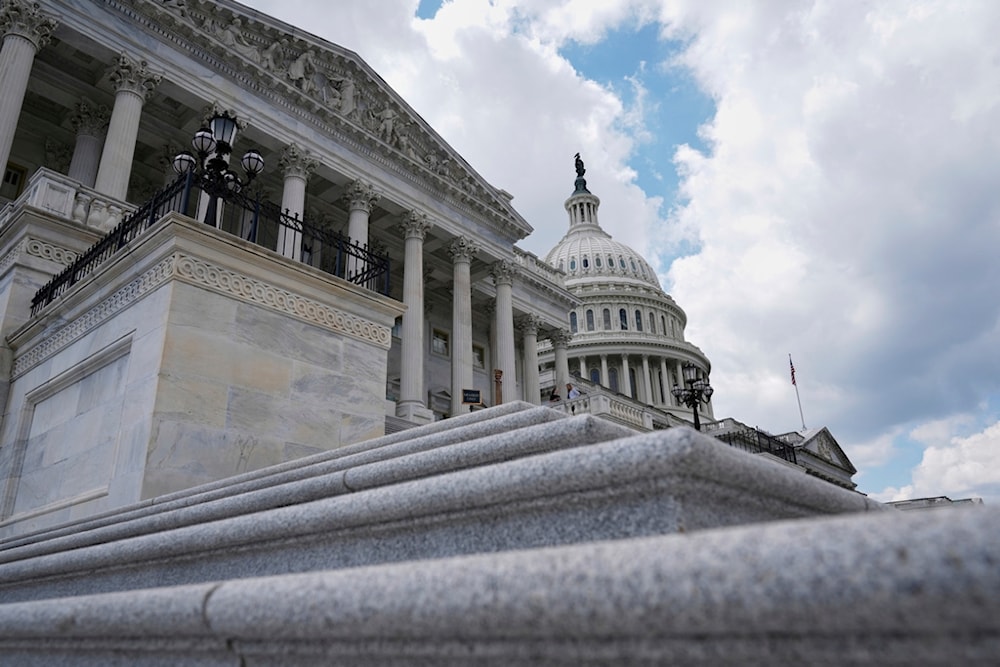Trump's $3.3T tax and spending bill faces House deadlock
US President Donald Trump's $3.3 trillion tax-and-spending bill, central to his second-term agenda, is facing a tough battle in the US House as Republican divisions threaten to derail its passage.
-

The US Capitol is photographed on July 2, 2025, in Washington. (AP Photo/Mariam Zuhaib)
US President Donald Trump's flagship tax-and-spending legislation is encountering serious resistance in the House of Representatives, as Republican leaders scramble to gather enough support from their ranks to push it through. The bill, which narrowly cleared the Senate with JD Vance casting the decisive vote after a marathon overnight session, now faces a volatile political terrain in the lower chamber.
Despite securing preliminary approval from the House Rules Committee earlier in the day, the full chamber was deadlocked during what was expected to be a routine five-minute procedural vote, one that ultimately stretched for over an hour. Republican leadership, unable to secure a clear majority, allowed members to leave the floor, signaling ongoing uncertainty.
Speaker Mike Johnson, alongside Trump and Senator Vance, had spent the day lobbying holdout conservatives to support the measure despite modifications made by the Senate. However, Johnson acknowledged the difficulty of uniting the party behind the sweeping legislation.
"When you have a piece of legislation that is this comprehensive and with so many agenda items involved, you're going to have lots of different priorities and preferences among people because they represent different districts and they have different interests," he told reporters.
"But we can't make everyone 100% happy. It's impossible. This is a deliberative body. It's a legislative process. By definition, all of us have to give up on our personal preferences. [I'm] never going to ask anybody to compromise core principles, but preferences must be yielded for the greater good, and that's what I think people are recognizing and come to grips with."
Debt, cuts, detentions
The House initially passed a version of the bill in May by a razor-thin margin, but after the Senate introduced several changes, most notably to Medicaid, fiscal conservatives began voicing strong objections. According to the Congressional Budget Office, the revised legislation is now projected to add $3.3 trillion to the federal deficit over the next decade, fueling further concerns among deficit hawks.
Speaker Johnson acknowledged that the Senate “went a little further than many of us would have preferred,” particularly in its Medicaid restructuring. Still, he remains committed to advancing the bill, aligning with Trump’s July 4 deadline for final enactment.
To address conservative demands, the updated bill imposes stricter work requirements for Medicaid recipients and caps a key state financing mechanism, changes that could result in service reductions for low-income populations. At the same time, the measure rolls back major green energy incentives from the Biden era, signaling a broader ideological shift.
In addition to the domestic spending changes, the legislation includes a significant expansion of immigration enforcement. It allocates $45 billion to expand detention facilities, $14 billion for deportation operations, and funds the hiring of 10,000 new immigration officers by 2029. Over $50 billion is also designated for border infrastructure, likely including new wall construction along the US–Mexico border. Together, these provisions reflect a comprehensive realignment of federal priorities along conservative lines, fiscally, socially, and politically.
Divided House showdown
Despite growing intraparty tension, some Republican members showed cautious optimism. "I think these votes will take a little bit or a lot longer than usual. But that's Washington. You guys are watching how the sausage is made, and that's how business is run," said Congresswoman Nancy Mace.
Texas Congressman Troy Nehls expressed reservations but said he would not block the bill simply over personal preferences. "There's things in the bill I don't like, but would I change the bill because I didn't get what I wanted? I don't think that would be good for America," he said.
Meanwhile, progressive lawmakers launched sharp attacks. On the House floor, Representative Alexandria Ocasio-Cortez denounced the bill in stark terms: "This bill is a deal with the devil. It explodes our national debt. It militarizes our entire economy, and it strips away healthcare and basic dignity of the American people."
Read more: Elon Musk slams Trump’s $5T spending bill
"For what? To give Elon Musk a tax break and billionaires, the greedy, taking of our nation. We cannot stand for it and we will not support it. You should be ashamed," added Cortez.
Moreover, former House Speaker Nancy Pelosi also condemned the bill's priorities, saying: "Is it beautiful to cut off food from seniors and children? Is it beautiful to cut off 17 million people from healthcare? Is it beautiful to do this? To give tax cuts to billionaires in our country? Is it beautiful to take money from education and the rest? The list goes on and on."
Read more: Dems target GOP's 'Big Ugly Bill' to flip House in 2026: Axios

 5 Min Read
5 Min Read










